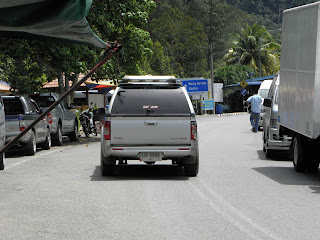NEW YORK, July 25 — The collapse of Lehman Brothers last September marked the start of a downward spiral for big investment banks. For a smaller fraternity of Internet brokerages, it has set off a dramatic spurt of growth.
Since the start of the financial crisis, US$32.2 billion (RM112 billion) has flowed into the two largest online outfits, TD Ameritrade Holding and Charles Schwab, company records show.
By contrast, investors have pulled more than US$100 billion from traditional full-service brokerages like Citigroup's Smith Barney and Bank of America-Merrill Lynch.
Of course, Americans still keep more of their wealth with established brokerages. According to research firm Gartner, 43 per cent of individual investors were with full-service brokers last year, compared with 24 per cent with online outfits.
And while figures for 2009 are not yet available, the flow of investors in the past 10 months has clearly been in the direction of the online brokerages, according to analysts both at Gartner and research consultancy Celent.
Joining the exodus is Ben Mallah, who says he lost US$3 million in a Smith Barney account in St Petersburg, Florida, as the markets crashed last year.
"I will never again trust anyone who is commission-driven to manage my portfolio," said Mallah. "If they're not making money off you, they have no use for you."
This trend, a product of both the financial crisis and the emergence of a new generation of tech-savvy, cost-conscious young investors, is positioning online outfits as increasingly important in the wealth management field.
The numbers reflect a loss of faith in professional money managers as small investors dress their wounds from the hammering they took over the last year, the Internet brokerages say.
"There has been an awakening," said Don Montanaro, chief executive of TradeKing, which reported a post-Lehman spike in new accounts of 121 per cent. Investors now realize they alone are responsible for their money, he said.
The S&P 500 fell 38 per cent in 2008 as the housing crisis turned into a broader credit crunch, bringing financial markets to a standstill and diminishing wealth across the board.
TD Ameritrade, the biggest by trades-per-day, saw a 46 per cent year-on-year jump in new accounts in the last quarter of 2008 and brought in US$7.8 billion in new assets.
Some of that is from "breakaway brokers", former Wall Street brokers who leave to form boutiques, directing their client trades through online platforms. But two-thirds of TD Ameritrade's US$240 billion under management is from its retail business serving individuals who manage their investments.
There are 16 established Internet brokerages operating in the United States, ranging from Zecco, which advertises US$4.50 per trade, to Charles Schwab, which offers a suite of options from bare bones to bespoke, including advice from in-house brokers.
Within that range, investors can choose to go it alone, access social networks where investors compare their portfolio strategies, seek paid advice, or any combination.
E*Trade, for example, owned by E Trade Financial, has grabbed the attention of younger investors with television spots featuring talking babies. It took in US$3.5 billion of new assets in the last quarter of last year.
Barriers to entry are low: trading accounts can be opened with as little as US$500, and trades executed for US$5 to US$7 each. And there is no commission.
Some investors are unwilling to pay commission in lean times. Others blame their brokers for their losses.
For Billy Scott of Prattville, Alabama, the catalyst was watching a 60 per cent return on a stock turn into a 70 per cent loss, as his Smith Barney broker told him to "hold." He ultimately lost US$10,000 in the crash.
Morgan Stanley Smith Barney, now a joint venture of Morgan Stanley and Citigroup, declined to respond.
In January this year, the 37-year-old father of two took his remaining US$11,000 over to a TradeKing account.
"When the market took a hit, I thought, hey, these people don't look any brighter than me," he said.
He says that he is mostly a day-trader now, having lost faith in the "hold" method his broker espoused.
Although day trading is a risky strategy, considered more akin to gambling than investing, Scott is pleased with his 8 per cent return to date.
"If anyone is going to lose my money, I want it to be me," he said.
Analysts see the financial collapse as having accelerated a trend that has been brewing over the last decade.
Even so, online outfits themselves recognise that they are competing for a limited customer base. "There is value in full service brokerages for people who don't have the knowledge or the desire to do it themselves," says Gabriel Dalporto, Zecco's chief strategy officer. "It's not like that industry is going to go away."
But the demographics point to growth for online outfits, because their users are those who have come of age with the Internet, says David Schehr, a research director with Gartner's industry advisory services.
The 2008 Gartner survey showed 17 per cent of "pre-booomers," those 63 years old and above, using online brokerages, compared with 29 per cent of "Gen X"ers — those age 33 to 44.
"The group that most typically uses the traditional model is the one that is growing older and ageing out," Schehr says.
Younger investors want instant access and execution, and can get "more information on their iPhones than brokers could get 10 years ago," said Scottrade's chief marketing officer, Chris Moloney.
And vibrant financial social networks are forming in the forums and blogs of these online brokerages, an extra attraction for the Facebook generation.
But the crash has also embittered older, seasoned, investors. Mallah, 43, said his brokers disregarded his directions to hold only safe municipal bonds. His losses came from, among others, Lehman-connected bonds and shares in the now-bankrupt ethanol maker Verasun.
Smith Barney said it has no record of his complaint.
The father of four brought more than US$15 million to a TD Ameritrade account in January and now spends "an enormous amount of time" on his portfolio. "But it's the only way to protect my assets and my family." — Reuters




















































